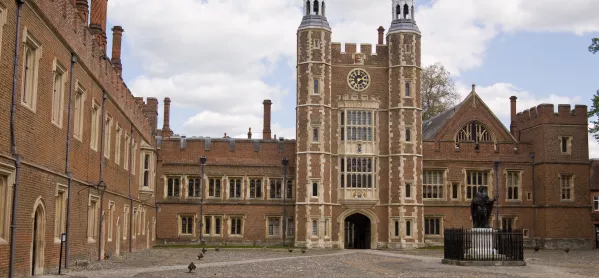Two-thirds of Boris Johnson’s cabinet were educated at independent schools, a new report shows - compared with just 7 per cent of the general population.
According to a report from the Sutton Trust social mobility charity, published today, 64 per cent of the newly appointed cabinet attended private schools, while 9 per cent went to grammar schools and 27 per cent were educated at a comprehensive.
Privilege: Elite five times more likely to have private education
Theresa May: Reshuffle increases the proportion of privately educated Cabinet ministers
Private schools: Scrapping Eton will become Labour policy, campaign says
Cabinet ministers are therefore nine times more likely to have gone to private school than the general population.
The private school elite?
The new cabinet has higher proportions of independent school alumni than Theresa May’s 2016 cabinet - when 30 per cent of ministers had gone to fee-paying schools - and David Cameron’s 2015 cabinet, when 50 per cent did so. It is similar to the 2010 coalition cabinet, when 62 per cent of ministers had gone to private school.
However, the new chancellor, education secretary, foreign secretary and home secretary were all educated at state schools.
The proportion of private school alumni in the cabinet is less than earlier cabinets of Conservative prime ministers. Under John Major in 1992, 71 per cent of the cabinet were privately educated, while 91 per cent of Margaret Thatcher’s cabinet in 1979 had attended private schools.
In both Tony Blair and Gordon Brown’s cabinets, 32 per cent of ministers had gone to fee-paying schools, while 25 per cent of Labour prime minister Clement Attlee’s first cabinet in 1945 were privately educated.
Almost half of the 33 ministers attending Mr Johnson’s new cabinet - 45 per cent - were educated at Oxford or Cambridge universities. This compares with 31 per cent of all Conservative MPs, 20 per cent of Labour MPs and 24 per cent of all MPs. A further 24 per cent of Mr Johnson’s Cabinet went to other Russell Group universities excluding Oxbridge.
The Sutton Trust said that as an Oxford university graduate, Mr Johnson “continues the academic dynasty at Number 10 that stretches back to before the start of World War 2”: every prime minister since 1937 who attended university was educated at one institution - Oxford.
Last month, the Sutton Trust published its report Elitist Britain, which surveyed the educational background of 5,000 influential people in Britain.
This report says that 29 per cent of current MPs in the House of Commons were privately educated, while in the Conservative Party just under half of MPs - 45 per cent - went to fee-paying schools, compared with 15 per cent of MPs in the Labour Party.
Sir Peter Lampl, founder and chairman of the Sutton Trust, said: “Britain is an increasingly divided society. Divided by politics, by class, by geography. Social mobility, the potential for those to achieve success regardless of their background, remains low. Addressing this must be at the heart of our new prime minister’s tenure in Downing Street.
“The make-up of Johnson’s cabinet underlines once again how unevenly spread the opportunities are to enter the elites. The key to improving social mobility at the top is to tackle financial barriers to entry, adopt contextual recruitment and admissions practices and, critically, to tackle social segregation in schools.”




